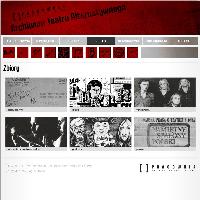Kolekcija pasakoja apie žymaus lietuvių teatro režisieriaus Jono Jurašo veiklą. 1972 m. jis buvo pašalintas iš Kauno dramos teatro režisieriaus pareigų. Jis nesutiko priimti sovietinių ideologų sąlygų, kurios reikalavo paklusti valdžios nurodymams. J. Jurašas laikėsi pozicijos, kad režisieriui, kaip menininkui, yra būtina kūrybos laisvė.
-
Vieta:
-
Kaunas Laisvės alėja 71, Lithuania 44304
-
Vilnius O. Milašiaus gatvė 21, Lithuania 10102
-
Vilnius Šv. Mykolo gatvė, Lithuania 01124
-
Temos:
-
Įkūrimo data:
-
Charakteringi eksponatai:
Kolekcija atskleidžia Modrio Tenisono trupės veiklą. Ją Tenisonas sukūrė 1966 ir tai buvo viena pirmųjų tokių trupių TSRS. Nuo 1967 m. ji kaip atskiras kolektyvas veikė Kauno nacionaliniame dramos teatre. Vėliau, 1970 m., trupė buvo perkelta į Kauno muzikinį teatrą. Trupė tapo plačiai dėl jos pasirodymo, o taip pat iš hipiško bendruomenės gyvenimo Kaune. Po Romo Kalantos susideginimo ir po to sekusio jaunimo protesto, Modris Tenisonas ir jo trupė buvo priversti palinkti Kauno muzikinį teatrą.
-
Vieta:
-
Vilnius O. Milašiaus gatvė 19, Lithuania 10102
-
Temos:
-
Įkūrimo data:
-
Charakteringi eksponatai:
The Alternative Theatre Archive is a research and archival project led by the Zbigniew Raszewski Theatre Institute in Warsaw with support of the KARTA Center Foundation. Its aim is to collect, gather in one location and digitize documents, prints, recordings, photographs and all other archival materials on the alternative theatre movement in Poland in the 1970s and the 1980s.
-
Vieta:
-
Warszawa Jazdów 1, Poland 00-467
-
Temos:
-
Įkūrimo data:
-
Charakteringi eksponatai:
Artistic Archive of the Studio Theatre and the Jerzy Grzegorzewski Section contain all the materials created by the theatre group since 1972 until today (the archives created before 1972 are deposited at the Zbigniew Raszewski Theatre Institute in Warsaw). This collection is a unique testimony of how the theatre functioned in the 1970s and the 1980s, trying to stay artistically and politically independent in the times of great cultural divisions in Poland. Especially the documents from the 1980s, during Jerzy Grzegorzewski's mandate as a director of the Theatre, provide a particularly interesting overview of the life of the institution at that point. Each play has its own dossier, containing different versions of scripts, notes of the theatre group, as well as video and audio recordings, which give an insight into the process of working on domestic and foreign plays at the dynamic times of political transformations and the martial law in Poland.
-
Vieta:
-
Warszawa plac Defilad 1, Poland 00-901
-
Temos:
-
Įkūrimo data:
-
Charakteringi eksponatai:
Fekete Lyuk means black hole in Hungarian. It reminds most Hungarians of a legendary club, which emerged quite suddenly in a traditional working-class district. It had a cult following among young intellectuals, punks, and skinheads, but it also quickly became a symbol of nonconformity and rebellion. However, hardly anybody remembers Gyula Nagy, the man who as an agitprop educator founded the Fekete Lyuk club.
-
Vieta:
-
Temos:
-
Įkūrimo data:
-
Charakteringi eksponatai:





